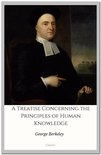A Treatise Concerning the Principles of Human Knowledge Ebook Tooltip Ebooks kunnen worden gelezen op uw computer en op daarvoor geschikte e-readers.
Afbeeldingen
Sla de afbeeldingen overArtikel vergelijken
- Engels
- E-book
- 9783736807617
- 09 januari 2019
- Adobe ePub
Productbeschrijving
A Treatise Concerning the Principles of Human Knowledge is a work by Anglo-Irish Empiricist philosopher George Berkeley. This book largely seeks to refute the claims made by his contemporary John Locke about the nature of human perception. Whilst, like all the Empiricist philosophers, both Locke and Berkeley agreed that we were having experiences, regardless of whether material objects exist or not. The world which caused the ideas one has within one's mind, Berkeley sought to prove that the outside world was also composed solely of ideas. Berkeley did this by suggesting that "Ideas can only resemble Ideas" - the mental ideas that we possessed could only resemble other ideas (not physical objects) and thus the external world consisted not of physical form, but rather of ideas. This world was given logic and regularity by some other force, which Berkeley concluded was God.
Berkeley declared that his intention was to make an inquiry into the First Principles of Human Knowledge in order to discover the principles that have led to doubt, uncertainty, absurdity, and contradiction in philosophy. In order to prepare the reader, he discussed two topics that lead to errors. First, he claimed that the mind cannot conceive abstract ideas. We can't have an idea of some abstract thing that is common to many particular ideas and therefore has, at the same time, many different predicates and no predicates. Second, Berkeley declared that words, such as names, do not signify abstract ideas. With regard to ideas, he asserted that we can only think of particular things that have been perceived. Names, he wrote, signify general ideas, not abstract ideas. General ideas represent any one of several particular ideas. Berkeley criticized Locke for saying that words signify general, but abstract, ideas. At the end of his Introduction, he advised the reader to let his words engender clear, particular ideas instead of trying to associate them with non–existent abstractions.
Productspecificaties
Inhoud
- Taal
- en
- Bindwijze
- E-book
- Oorspronkelijke releasedatum
- 09 januari 2019
- Ebook Formaat
- Adobe ePub
- Illustraties
- Nee
Betrokkenen
- Hoofdauteur
- George Berkeley
- Tweede Auteur
- George Berkeley
- Hoofdredacteur
- Jhon Duran
- Hoofduitgeverij
- Bookrix
Lees mogelijkheden
- Lees dit ebook op
- Android (smartphone en tablet) | Kobo e-reader | Desktop (Mac en Windows) | iOS (smartphone en tablet) | Windows (smartphone en tablet)
Overige kenmerken
- Studieboek
- Nee
EAN
- EAN
- 9783736807617
Je vindt dit artikel in
- Categorieën
-
Kies gewenste uitvoering
Prijsinformatie en bestellen
De prijs van dit product is 2 euro en 99 cent.- E-book is direct beschikbaar na aankoop
- E-books lezen is voordelig
- Dag en nacht klantenservice
- Veilig betalen
Alle bindwijzen en edities (8)
Rapporteer dit artikel
Je wilt melding doen van illegale inhoud over dit artikel:
- Ik wil melding doen als klant
- Ik wil melding doen als autoriteit of trusted flagger
- Ik wil melding doen als partner
- Ik wil melding doen als merkhouder
Geen klant, autoriteit, trusted flagger, merkhouder of partner? Gebruik dan onderstaande link om melding te doen.
















